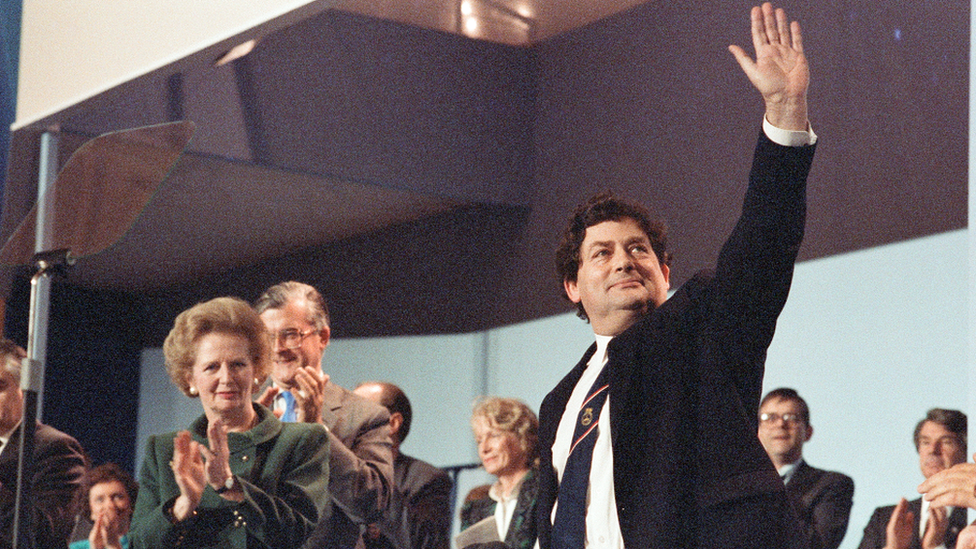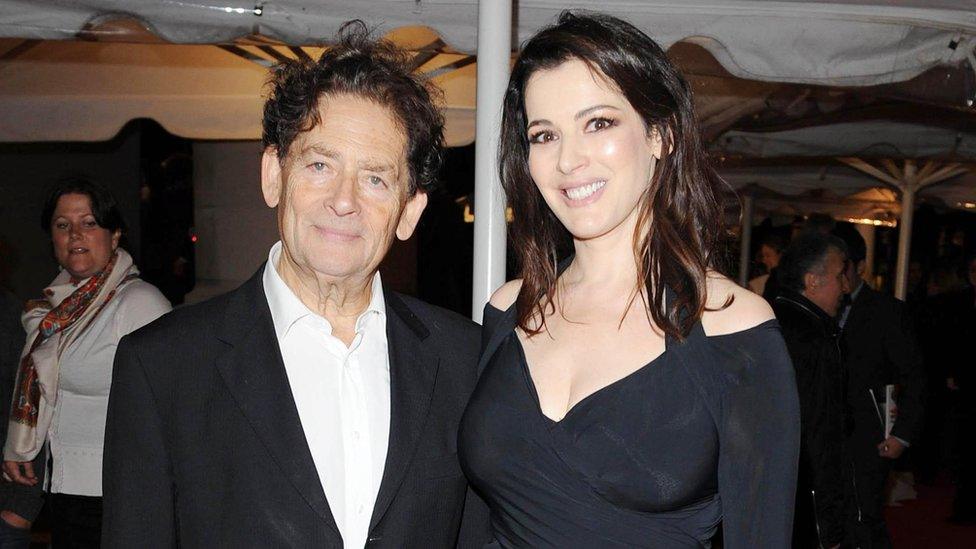Nigel Lawson: Reforming chancellor dies aged 91
- Published

Prime Minister Margaret Thatcher applauding Nigel Lawson at the 1989 Conservative Party Conference
Former Conservative Chancellor Nigel Lawson has died at the age of 91.
Holding several cabinet posts under Margaret Thatcher in the 1980s, he was seen as one of the most consequential of all post-war UK chancellors.
Prime Minister Rishi Sunak called him an "inspiration to me and many others".
He is credited with creating powerful entrepreneurial forces in a decade also remembered by many communities around the UK as a time of widening inequality and painful deindustrialisation.
Lord Lawson is survived by six children, including Nigella Lawson, a food writer and celebrity cook.
The prime minister posted a picture of himself, external as chancellor with the caption: "One of the first things I did as chancellor was hang a picture of Nigel Lawson above my desk."
In other tributes:
Former Prime Minister Boris Johnson called him a "fearless and original flame of free market Conservatism", external who "helped millions of British people achieve their dreams"
Fellow former Prime Minister Liz Truss described him as a "true giant of 20th Century politics", external, adding "his time at the helm of the Treasury was transformational"
Current Chancellor Jeremy Hunt said his shoes had been "impossible to fill", external but he "inspired all his successors, leaving the country more prosperous and enterprising"
Former Chancellor Norman Lamont told the BBC he had a "great sense of humour and fun", adding he was "not a pompous character at all"
Labour leader Sir Keir Starmer described him as a "real powerhouse"
The Telegraph, external first reported his death and his family are yet to comment.
Before entering politics, Lawson was a successful financial journalist and continued publishing regular articles in the Telegraph and Spectator until as recently as November last year.
He would go on to be one of the "big beasts" of Thatcher's cabinets, as well as serving as MP for the Blaby constituency from 1974 to 1992.
Thatcher, who died in 2013, put him in charge of the Treasury in 1983, where he cut income tax, boosted share ownership and paid off government debt.
As chancellor he modernised London's financial markets, overseeing the UK financial sector's Big Bang, where deregulation of stock exchange membership and embracing electronic trading helped to establish London as a major global financial centre.
The resulting economic growth was eventually named the Lawson Boom, after the chancellor who had championed these changes.
His stewardship of the economy was credited with helping Thatcher win a third term.
But lower taxes together with cheaper borrowing fuelled an unsustainable boom. Interest rates rose sharply and Britain went into recession.

Nigel Lawson with his daughter Nigella in 2008
During his tenure Thatcher called Lawson "unassailable", but he resigned in 1989, after falling out with her over Europe.
He stepped down as an MP at the 1992 election before entering the House of Lords as Lord Lawson of Blaby, only retiring last December.
Lawson used his platform in the Lords to express scepticism of man-made climate change.
In 2016 he became the chairman of Vote Leave, the group which led the campaign for the UK's exit from the EU. He described Brexit as a "historic opportunity" to finish the job Thatcher had started.
One of his most eye-catching recent political interventions was his backing of Mr Sunak over Ms Truss in last summer's Conservative leadership contest, when he said Ms Truss's tax-cutting plans were not in the Thatcherite tradition and would risk going back to the mistakes of the 1970s.
The financial market turmoil which followed the package of tax cuts announced in September's mini-budget will be cited by his admirers as evidence of the lasting quality of his economic judgement.